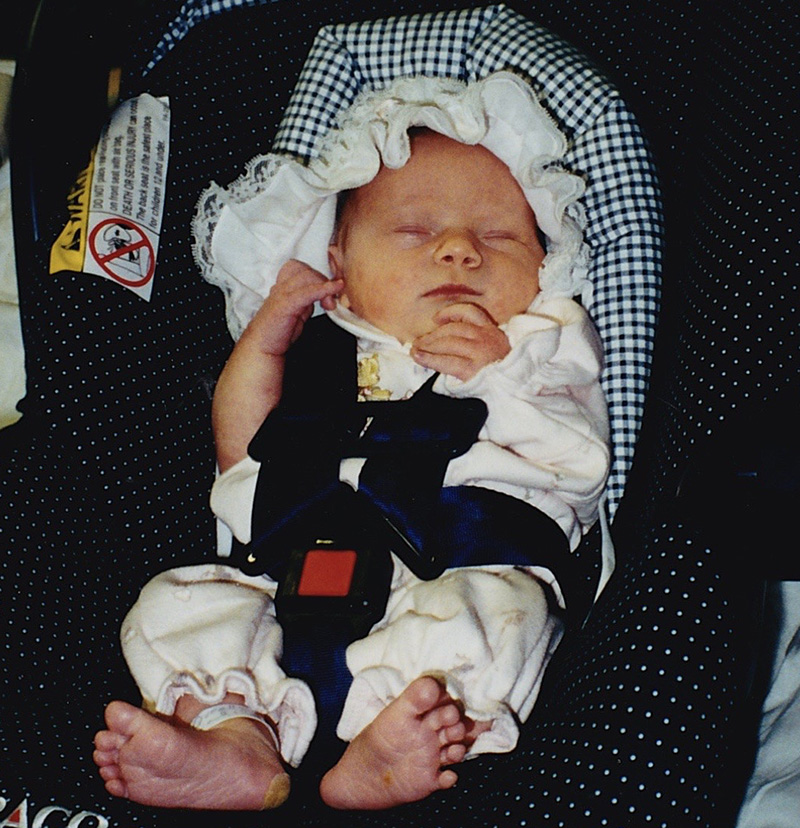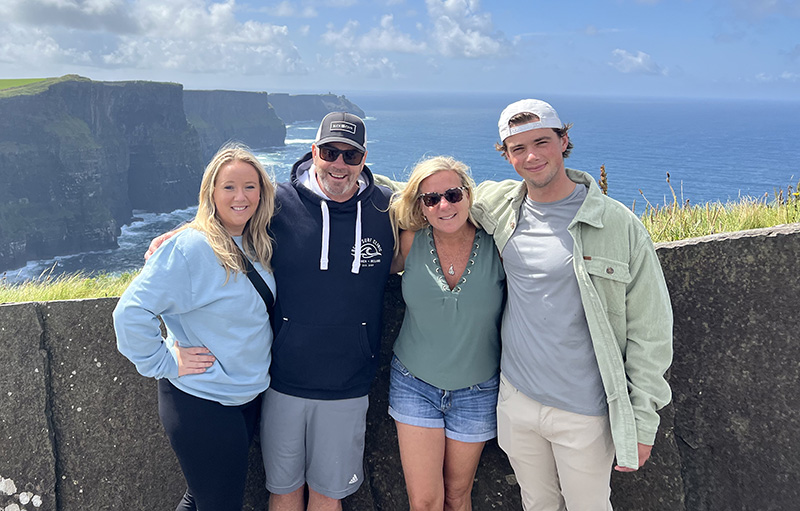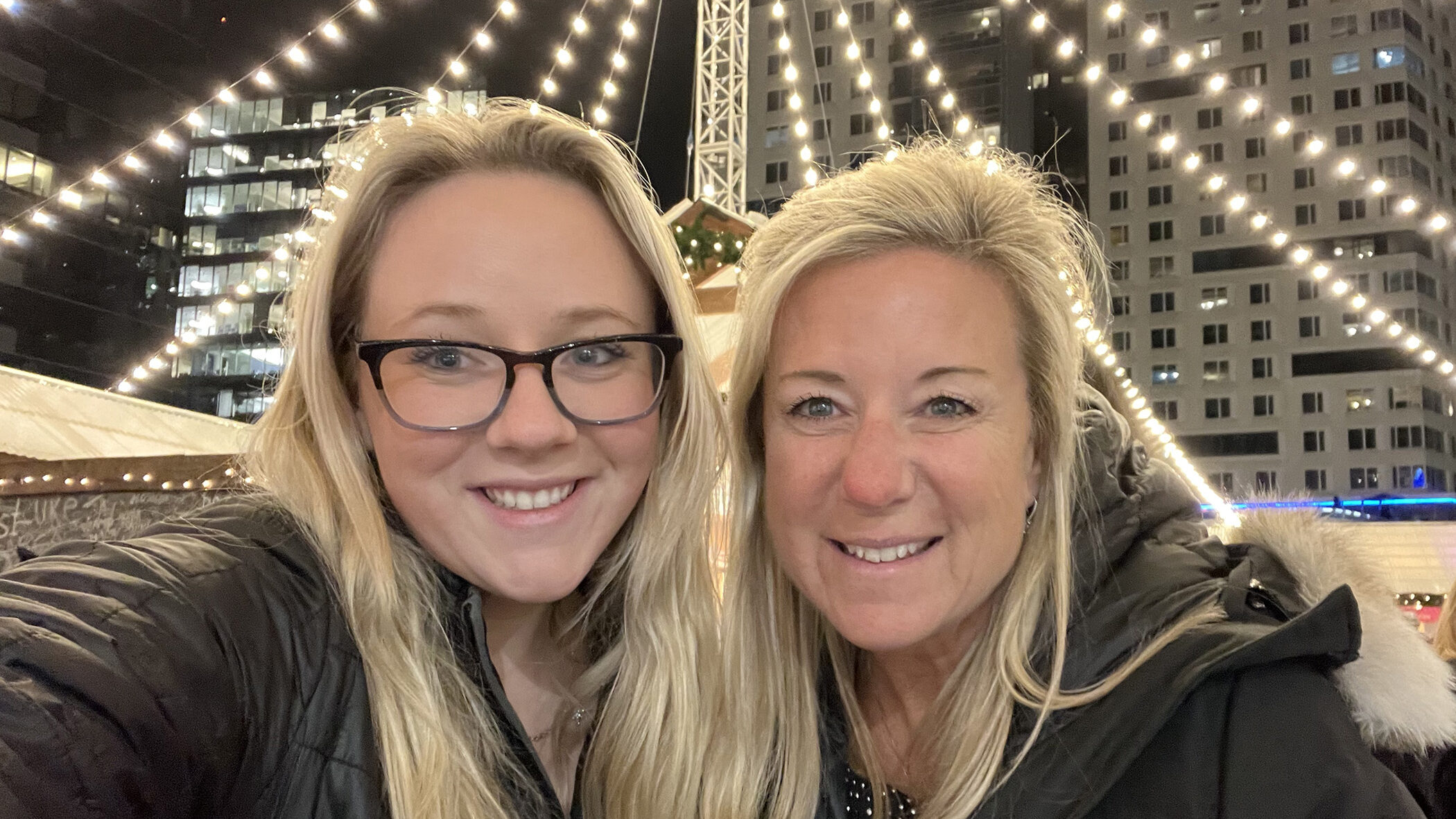PKU Advocate, Parent Shares Personal Experience with Early Diagnosis
September 30, 2024
Denise Queally still vividly remembers 23 years ago when she received an unexpected call from her daughter’s pediatrician, whom she had yet to even meet.
The doctor shared that Denise’s daughter, Caroline, had screened positive for phenylketonuria (PKU), a rare, genetic metabolic condition characterized by an enzyme deficiency that inhibits the body’s ability to break down an amino acid called phenylalanine found in all foods with protein.
“I was sitting on the couch next to my mom, clutching her hand for dear life and holding my beautiful baby girl in the other, still recovering from a C-section,” recalls Denise. “I was nervous – terrified honestly – about what the future would hold. But for us, early detection has been a very good news story.”
Denise says that receiving her daughter’s diagnosis when she was just days old set the family on a mission to manage the condition effectively. It also led the family to a close-knit community, and inspired Denise to become an advocate – for people living with PKU and other metabolic conditions, as well as for the importance of newborn screening. She is currently the President of New England Connection for PKU and Allied Disorders (NECPAD), was a former board member of the National PKU Alliance (NPKUA), and has served on the U.S. Health and Human Services Advisory Committee on Heritable Disorders in Newborns and Children Evidence Review Subcommittee.
Denise and her daughter, Caroline, have also been guest lecturers at Harvard Medical School, Massachusetts Institute of Technology (MIT) and Boston University Medical School.
We caught up with Denise to mark the end of Newborn Screening Awareness Month. Learn more about her personal experience with early diagnosis, her work with NECPAD and how she would like to see newborn screening evolve in the coming years.
Q: What has newborn screening and receiving a diagnosis as early as possible meant to you and your family?
Our lives could have been different without that early diagnosis. That simple heel prick helped avoid otherwise irreversible damage that could have been done if Caroline had not been on a low-protein diet from the beginning. Newborn screening is so essential. I am overcome with emotion every time I think about that blood spot and am forever grateful. Bottom line: It saves lives and it also saves quality of life for countless persons living with the conditions, as well as their families and caregivers. Today, our daughter is a beautiful and very intelligent young lady who would have had a much more difficult path without newborn screening. So, I feel extremely blessed to have gotten that call.

A heel prick and blood test was done when Caroline was first born, enabling an early diagnosis of PKU.
Q: How did you get involved as an advocate for the PKU and allied disorders community?
Pretty much from day one, I want to say that our metabolic team from Boston Children’s Hospital knew I would become passionately involved in our community because I was asking the right questions, and my husband, Desi, and I were intent on taking care of our Caroline. We were told about NECPAD, introduced to other families and we became really intertwined with the community. We wanted to meet and spend time with adults living with PKU and frankly, know they were okay, and that our daughter was going to be okay. And now, our family can help play that role for others. I consider many of the adults living with PKU whom I have met along the way, as well as their parents, some of my closest and treasured friends and, frankly, role models for our Caroline and me! I am totally inspired by our rare community, whom I consider family.
Q: How does NECPAD support people with PKU and their families?
We provide support and services to all individuals and families living with PKU and allied disorders across New England, while also encouraging research and working to increase public awareness of metabolic conditions. We have a lot of activities throughout the year to help bring our community together, because that’s so important, for both adults and kids, but especially the kids, so they can spend quality and super fun time with other kids who are just like them. And adults living with metabolic conditions, parents and caregivers can find support from others who are in similar situations.
We also do all we can to help people who are not currently engaged in healthcare get back on track in managing their condition. To do that successfully, we meet people where they’re at, with empathy and without judgment. They may need support in getting back on diet, or even in doing simple tasks that are hard for someone experiencing the brain fog that can come with PKU. Some people may need financial assistance or transportation to get back into the clinic. Whatever people need, we do our very best to find ways to make it happen so they can get back in front of a healthcare provider and come up with a plan for the best way to manage their condition. NECPAD is also a very strong advocate for our community on the federal level. We inspire other nonprofit organizations and other stakeholders to meet people where they’re at, and also advocate for better healthcare coverage for all through the Medical Nutrition Equity Act (MNEA).
Q: What advice do you give to new parents after they’ve received a PKU diagnosis via newborn screening?
I encourage families to be as positive as possible. Think about it – parents need to feed their children anyway, milk at the beginning. With PKU, they just need to feed their infant with a different ‘milk.’ The burden of the diet does fall on the parents and caregivers initially, but children will eventually learn what to do with the right guidance. Children take their lead from their families and those in your circle whom you surround yourself with. Be honest, of course, but always have a positive outlook. Everyone has something – we need to adjust to what comes our way in the best ways possible and join together as a rare family to help each other. I also tell people that we are in a good position as a community in that there are treatment options, dietary requirements are well-understood, with many low-protein choices available, and PKU is still being studied, with new options on the horizon. There is a lot to be positive, and forward-thinking, about.

The Queally family – from left, Caroline, Desi, Denise, and Shane.
Q: What are your hopes for the future of newborn screening?
I’m hopeful that newborn screening continues to expand to cover more conditions and the goals of newborn screening will be fully realized. It’s definitely a complex issue, and there are other parents who may not feel the way I do. I know for parents of some children with serious conditions where there are no good treatment options it can be a challenge. But as a parent whose child has benefited tremendously from early diagnosis, I’ll always be of the mind that I’d want to know, because if there were ever a chance to cure a condition, or treat it, or fight for it, I’d want to do that. I also hope the conversation around the amazing, life-saving benefits of newborn screening will inspire our lawmakers to fully support the program and its goals, and push for greater access to comprehensive treatment and care.



